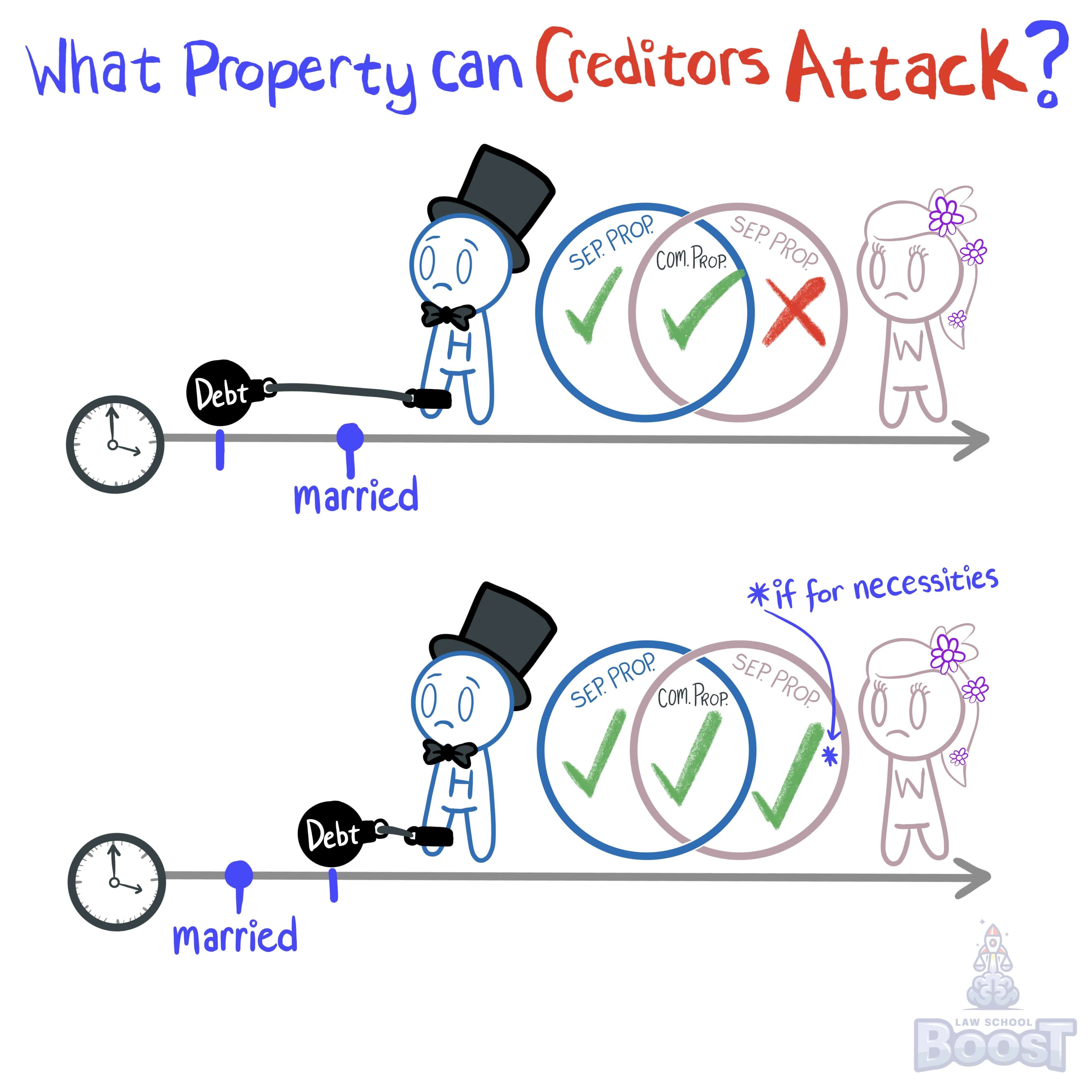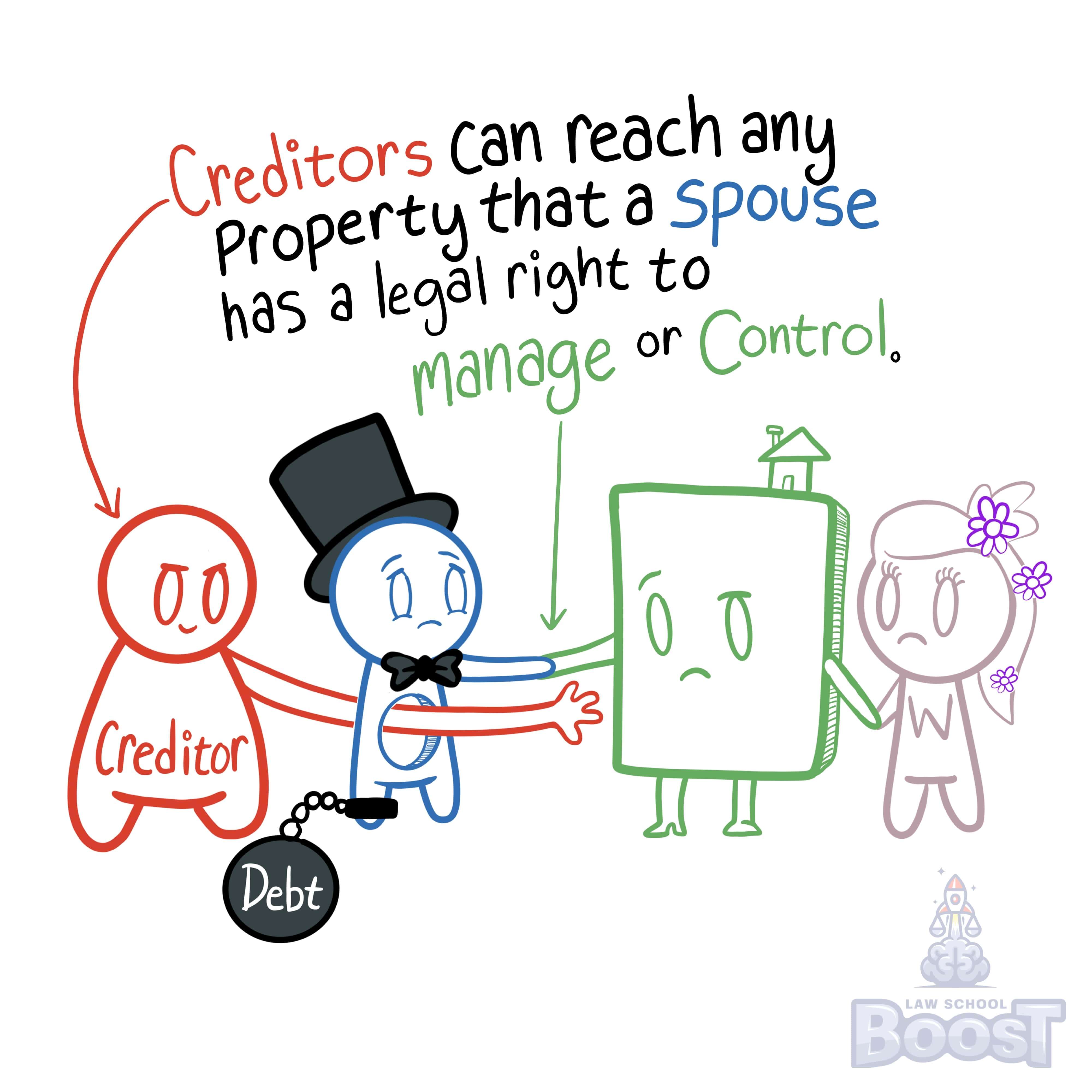🤧
Community Property • Analysis of Creditor's Rights
CPROP#057
Legal Definition
Where a debt is incurred during marriage, a creditor may reach all the community property, all the debtor's separate property, and the separate property of the non-debtor spouse only where the debt is contractual and is for necessities.
Plain English Explanation
When two people are married, if they owe money for something they truly need, like food or a place to live, the person they owe the money to can take things from both people to pay for it. But this only works if both people agreed to buy the thing they need.
Hypothetical
Hypo 1: Bob and Amy are married. Bob takes a loan to buy a luxury yacht during their marriage. He fails to repay the loan. Result: The creditor can claim the yacht, any other property Bob owns separately, and any property that Bob and Amy own together. However, they cannot claim Amy's separate property because the yacht is not a necessity.
Hypo 2: Bob and Amy are married. During their marriage, Bob incurs a debt to pay for his medical bills. He fails to repay the debt. Result: The creditor can claim any property Bob owns separately, any property that Bob and Amy own together, and even Amy's separate property because medical care is a necessity.
Hypo 3: Bob and Amy are married. Bob takes a loan to start a business during their marriage. He fails to repay the loan. Result: The creditor can claim any property Bob owns separately and any property that Bob and Amy own together. However, they cannot claim Amy's separate property because starting a business is not a necessity.
Hypo 4: Bob and Amy are married. Bob incurs a debt to buy groceries and pay rent during their marriage. He fails to repay the debt. Result: The creditor can claim any property Bob owns separately, any property that Bob and Amy own together, and even Amy's separate property because groceries and shelter are necessities.
Hypo 5: Bob incurs a debt before marrying Amy. After their marriage, he fails to repay the debt. Result: The creditor can claim any property Bob owns separately and any property that Bob and Amy own together. However, they cannot claim Amy's separate property because the debt was not incurred during their marriage.
Hypo 2: Bob and Amy are married. During their marriage, Bob incurs a debt to pay for his medical bills. He fails to repay the debt. Result: The creditor can claim any property Bob owns separately, any property that Bob and Amy own together, and even Amy's separate property because medical care is a necessity.
Hypo 3: Bob and Amy are married. Bob takes a loan to start a business during their marriage. He fails to repay the loan. Result: The creditor can claim any property Bob owns separately and any property that Bob and Amy own together. However, they cannot claim Amy's separate property because starting a business is not a necessity.
Hypo 4: Bob and Amy are married. Bob incurs a debt to buy groceries and pay rent during their marriage. He fails to repay the debt. Result: The creditor can claim any property Bob owns separately, any property that Bob and Amy own together, and even Amy's separate property because groceries and shelter are necessities.
Hypo 5: Bob incurs a debt before marrying Amy. After their marriage, he fails to repay the debt. Result: The creditor can claim any property Bob owns separately and any property that Bob and Amy own together. However, they cannot claim Amy's separate property because the debt was not incurred during their marriage.
Visual Aids


Related Concepts
What are the most common type of debts incurred and how are they treated?
When a debt is incurred before marriage, whose property is available to creditors attempting to satisfy the debt?
When debts are incurred for the benefit of the community, whose property is available to creditors attempting to satisfy the debt?
When debts are incurred NOT for the benefit of the community, whose property is available to creditors attempting to satisfy the debt?


